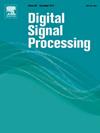Multiscale entropy rates: A study on different stochastic processes
IF 2.9
3区 工程技术
Q2 ENGINEERING, ELECTRICAL & ELECTRONIC
引用次数: 0
Abstract
In this paper, we propose to analyze the behavior of the entropy rate (ER) when applied to a signal and its coarse-grained versions. The “multiscale entropy rate” (MSER) is deduced by storing in a vector the resulting ERs. Our contribution consists in studying the MSER calculated on different stochastic processes. When dealing with Gaussian complex or real moving average (MA) processes or autoregressive (AR) processes, which can be seen as the filtering of a white Gaussian driving process, the MSER depends on the variances of the driving processes of the corresponding minimum-phase ARMA process at each scale. More particularly, we derive the analytical expression of the MSER for -order MA or AR processes using different approaches. This study allows us to better understand what each scale brings in and to describe the behavior of the MSER for these types of processes. We also show that there is a mapping between the stochastic-process parameters and the ER computed at different scales. Finally, we show that the multiscale procedure is not relevant for a sum of complex exponentials disturbed by an additive white Gaussian noise.
多尺度熵率:不同随机过程的研究
在本文中,我们建议分析熵率(ER)在应用于信号及其粗粒度版本时的行为。“多尺度熵率”(MSER)是通过将得到的熵率存储在一个向量中推导出来的。我们的贡献在于研究了在不同随机过程中计算的MSER。当处理高斯复过程或实移动平均(MA)过程或自回归(AR)过程时,MSER取决于相应的最小相位ARMA过程在每个尺度上的驱动过程的方差,这些过程可以看作是对白色高斯驱动过程的滤波。更具体地说,我们使用不同的方法推导了一阶MA或AR过程的MSER的解析表达式。这项研究使我们能够更好地理解每个量表带来的内容,并描述MSER在这些类型的过程中的行为。我们还证明了随机过程参数与不同尺度下计算的ER之间存在映射关系。最后,我们证明了多尺度过程与受加性高斯白噪声干扰的复指数和无关。
本文章由计算机程序翻译,如有差异,请以英文原文为准。
求助全文
约1分钟内获得全文
求助全文
来源期刊

Digital Signal Processing
工程技术-工程:电子与电气
CiteScore
5.30
自引率
17.20%
发文量
435
审稿时长
66 days
期刊介绍:
Digital Signal Processing: A Review Journal is one of the oldest and most established journals in the field of signal processing yet it aims to be the most innovative. The Journal invites top quality research articles at the frontiers of research in all aspects of signal processing. Our objective is to provide a platform for the publication of ground-breaking research in signal processing with both academic and industrial appeal.
The journal has a special emphasis on statistical signal processing methodology such as Bayesian signal processing, and encourages articles on emerging applications of signal processing such as:
• big data• machine learning• internet of things• information security• systems biology and computational biology,• financial time series analysis,• autonomous vehicles,• quantum computing,• neuromorphic engineering,• human-computer interaction and intelligent user interfaces,• environmental signal processing,• geophysical signal processing including seismic signal processing,• chemioinformatics and bioinformatics,• audio, visual and performance arts,• disaster management and prevention,• renewable energy,
 求助内容:
求助内容: 应助结果提醒方式:
应助结果提醒方式:


